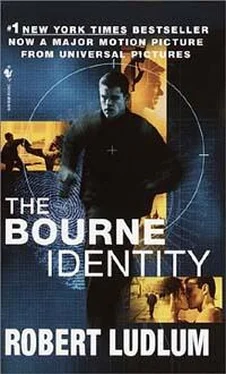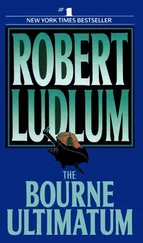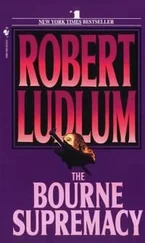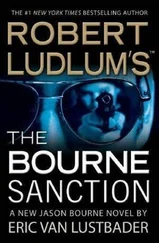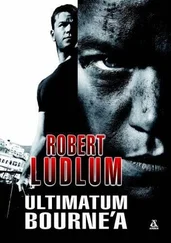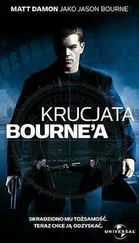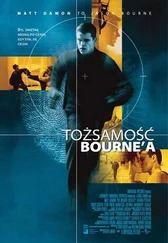Out in the street he had flagged a taxi. He was opening the door, motioning for Jacqueline to get inside. Oh, God! She was going!
The middle-aged man turned and ran as fast as he could toward the staircase. He collided with two startled customers and a salesclerk, pushing all three violently out of his way. He raced up the steps, across the balcony and down the corridor, to the open studio door.
“René! René!” he shouted, bursting inside.
Bergeron looked up from his sketchboard, astonished. “What is it?”
“That man with Jacqueline! Who is he? How long has he been here?”
“Oh? Probably the American,” said the designer. “His name’s Briggs. A fatted calf; he’s done very well by our grosses today.”
“Where did they go?”
“I didn’t know they went anywhere.”
“She left with him!”
“Our Jacqueline retains her touch, no? And her good sense.”
“Find them! Get her!”
“Why?”
“He knows! He’ll kill her!”
“What?”
“It’s him! I’d swear to it! That man is Cain!”
“The man is Cain,” said Colonel Jack Manning bluntly, as if he expected to be contradicted by at least three of the four civilians at the Pentagon conference table. Each was older than he, and each considered himself more experienced. None was prepared to acknowledge that the army had obtained information where his own organization had failed. There was a fourth civilian but his opinion did not count. He was a member of the Congressional Oversight Committee, and as such to be treated with deference, but not seriously. “If we don’t move now,” continued Manning, “even at the risk of exposing everything we’ve learned, he could slip through the nets again. As of eleven days ago, he was in Zurich. We’re convinced he’s still there. And, gentlemen, it is Cain.”
“That’s quite a statement,” said the balding, birdlike academic from the National Security Council as he read the summary page concerning Zurich given to each delegate at the table. His name was Alfred Gillette, an expert in personnel screening and evaluation, and was considered by the Pentagon to be bright, vindictive, and with friends in high places.
“I find it extraordinary,” added Peter Knowlton, an associate director of the Central Intelligence Agency, a man in his middle fifties who perpetuated the dressy the appearance, and the attitude of an Ivy Leaguer of thirty years ago. “Our sources have Cain in Brussels, not Zurich, at the same time—eleven days ago. Our sources are rarely in error.”
“That’s quite a statement,” said the third civilian, the only one at that table Manning really respected. He was the oldest there, a man named David Abbott, a former Olympic swimmer whose intellect had matched his physical prowess. He was in his late sixties now, but his bearing was still erect, his mind as sharp as it had ever been, his age, however, betrayed by a face lined from the tensions of a lifetime he would never reveal. He knew what he was talking about, thought the colonel. Although he was currently a member of the omnipotent Forty Committee, he had been with the CIA since its origins in the OSS. The Silent Monk of Covert Operations had been the sobriquet given him by his colleagues in the intelligence community. “In my days at the Agency,” continued Abbott, chuckling, “the sources were often as not in conflict as in agreement.”
“We have different methods of verification,” pressed the associate director. “No disrespect, Mr. Abbott, but our transmissions equipment is literally instantaneous.”
“That’s equipment, not verification. But I won’t argue; it seems we have a disagreement. Brussels or Zurich.”
“The case for Brussels is airtight,” insisted Knowlton firmly.
“Let’s hear it,” said the balding Gillette, adjusting his glasses. “We can return to the Zurich summary; it’s right in front of us. Also, our sources have some input to offer, although it’s not in conflict with Brussels or Zurich. It happened some six months ago.” The silver-haired Abbott glanced over at Gillette. “Six months ago? I don’t recall NSC having delivered anything about Cain six months ago.”
“It wasn’t totally confirmed,” replied Gillette. “We try not to burden the committee with unsubstantiated data.”
“That’s also quite a statement,” said Abbott, not needing to clarify.
“Congressman Walters,” interrupted the colonel, looking at the man from Oversight, “do you have any questions before we go on?”
“Hell, yes,” drawled the congressional watchdog from the state of Tennessee, his intelligent eyes roaming the faces, “but since I’m new at this, you go ahead so I’ll know where to begin.”
“Very well, sir,” said Manning, nodding at the CIA’s Knowlton. “What’s this about Brussels eleven days ago?”
“A man was killed in the Place Fontainas—a covert dealer in diamonds between Moscow and the West. He operated through a branch of Russolmaz, the Soviet firm in Geneva that brokers all such purchases. We know it’s one way Cain converts his funds.”
“What ties the killing to Cain?” asked the dubious Gillette.
“Method, first. The weapon was a long needle, implanted in a crowded square at noontime with surgical precision. Cain’s used it before.”
“That’s quite true,” agreed Abbott. “There was a Rumanian in London somewhat over a year ago; another only weeks before him. Both were narrowed to Cain.”
“Narrowed but not confirmed,” objected Colonel Manning. “They were high-level political defectors; they could have been taken by the KGB.”
“Or by Cain with far less risk to the Soviets,” argued the CIA man.
“Or by Carlos,” added Gillette, his voice rising. “Neither Carlos nor Cain is concerned about ideology; they’re both for hire. Why is it every time there’s a killing of consequence, we ascribe it to Cain?”
“Whenever we do,” replied Knowlton, his condescension obvious, “it’s because informed sources unknown to each other have reported the same information. Since the informants have no knowledge of each other, there could hardly be collusion.”
“It’s all too pat,” said Gillette disagreeably.
“Back to Brussels,” interrupted the colonel. “If it was Cain, why would he kill a broker from Russolmaz? He used him.”
“A covert broker,” corrected the CIA director. “And for any number of reasons, according to our informants. The man was a thief, and why not? Most of his clients were too; they couldn’t very well file charges. He might have cheated Cain, and if he did, it’d be his last transaction. Or he could have been foolish enough to speculate on Cain’s identity; even a hint of that would call for the needle. Or perhaps Cain simply wanted to bury his current traces. Regardless, the circumstances plus the sources leave little doubt that it was Cain.”
“There’ll be a lot more when I clarify Zurich,” said Manning. “May we proceed to the summary?”
“A moment, please.” David Abbott spoke casually while lighting his pipe. “I believe our colleague from the Security Council mentioned the occurrence related to Cain that took place six months ago. Perhaps we should hear about it.”
“Why?” asked Gillette, his eyes owl-like beyond the lenses of his rimless glasses. “The time factor removes it from having any bearing on Brussels or Zurich. I mentioned that, too.”
“Yes, you did,” agreed the once-formidable Monk of Covert Services. “I thought, however, any background might be helpful. As you also said, we can return to the summary; it’s right in front of us. But if it’s not relevant, let’s get on with Zurich.”
“Thank you, Mr. Abbott,” said the colonel. “You’ll note that eleven days ago, four men were killed in Zurich. One of them was a watchman in a parking area by the Limmat River, it can be presumed that he was not involved in Cain’s activities, but caught in them. Two others were found in an alley on the west bank of the city, on the surface unrelated murders, except for the fourth victim. He’s tied in with the dead men in the alley—all three part of the Zurich—Munich underworld—and is, without question, connected to Cain.”
Читать дальше
